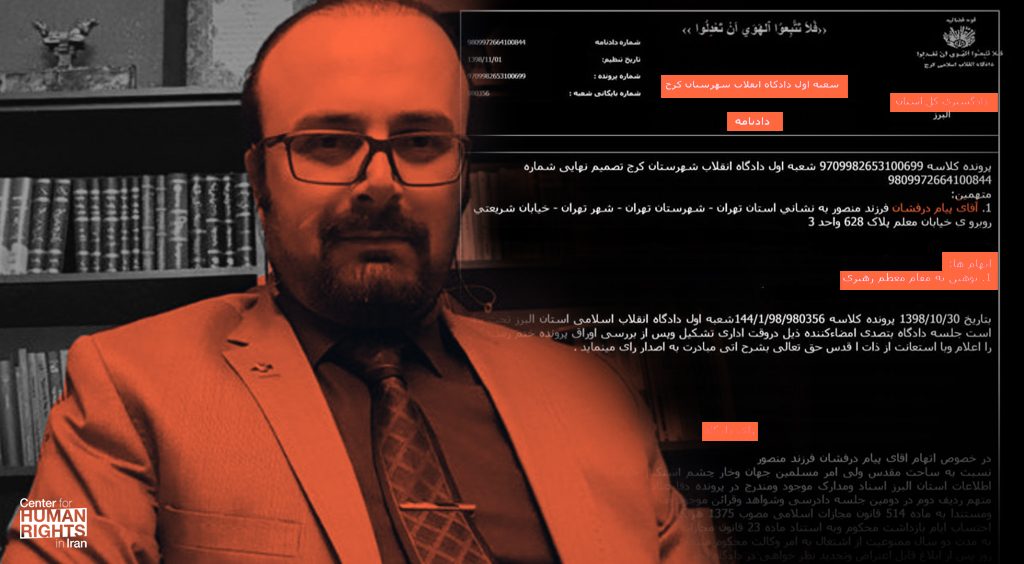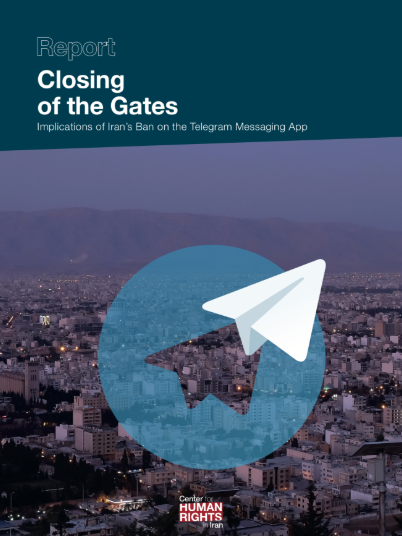Human Rights Lawyer Sentenced to Prison Without Access to Counsel
 Four Defense Attorneys Imprisoned in Iran in Less Than Two Years
Four Defense Attorneys Imprisoned in Iran in Less Than Two Years
Human rights attorney Payam Derafshan was denied access to counsel while being tried for the charge of “insulting the supreme leader,” for which he was sentenced to two years imprisonment and suspended from practicing law for an additional two years.
“The court did not allow his defense lawyers to be present at the trial,” his lawyer, Saeed Dehghan, told the Center for Human Rights in Iran (CHRI) on May 10, 2020.
“They were not even allowed to review the case,” he added. “They were allowed to read a few pages of the case file after the verdict was issued, which is a violation of the law.”
Derafshan is the fourth known high-profile human rights attorney to be sentenced to prison under trumped-up charges in Iran in less than two years.
Since 2018, the Iranian judiciary chief has been silent as defense attorneys around the country continue to be jailed after taking on politically sensitive cases and issues.
Derafshan has represented multiple individuals facing politically motivated charges including Iranian Canadian conservationist Kavous Seyed-Emami, who died in state custody while being held for interrogations in Tehran’s Evin Prison.
Derafshan was sentenced by Branch 1 of the Revolutionary Court in the city of Karaj, west of Tehran.
Jailed for Challenging Judiciary’s Ban on Messaging App
Dehghan told CHRI that Derafshan was arrested on July 31, 2018, while visiting the home of fellow human rights attorney Arash Keykhosravi. He added that judicial officials sought Derafshan’s imprisonment because he publicly challenged a judicial ban on a widely used messaging app.
“The prosecutor of Alborz Province had ordered the arrest of anyone coming to the house,” Dehghan said. “When Payam got there, he was arrested and charged with unlawful assembly.”
“While being interrogated, he was asked a lot of questions about a petition he helped launch that demanded answers from the judicial official who ordered the ban on Telegram,” he added, referring to the widely used messaging app that the Iranian government outlawed in May 2018.
Although his interrogators were almost entirely focused on Derafshan’s public challenge to the judiciary’s ban on the app, he was formally charged with “insulting the supreme leader” through his personal chats on Telegram and WhatsApp.
Speaking to CHRI about the sentence issued against Derafshan, Dehghan said he and his colleagues were aware that they could be persecuted for publicly challenging state censorship policies.
“As soon as we filed a petition against Assistant Prosecutor Ghasemzadeh, we knew anything could happen to us,” he said. “At the time, we received indirect threats for accepting [human rights] cases. They also arrested Arash Keykhosravi along with Ghasem Sholeh Sa’di at a rally in front of Parliament.
“Payam had not done anything wrong, so they brought trumped-up charges based on his private chats and accused him of insulting the leadership,” said Dehghan. “Unfortunately, it is becoming common to invade people’s private lives and spaces [in Iran].”
In a joint petition addressing the judiciary on May 7, 2018, attorneys Derafshan, Keykhosravi, Abouzar Nasrollahi, Saeed Dehghan, Javad Parsa, and Mohammad Moghimi demanded Assistant Prosecutor Bijan Ghasemzadeh overturn his order to ban Telegram on May 1, 2018.
“The order not only violates the Criminal Procedures Regulations, but also the Constitution,” Derafshan told CHRI on May 7, 2018.
“The assistant prosecutor’s job is to collect evidence and present it to the court and then the judge makes a preliminary ruling and after that it will reach the appellate stage,” he added. “None of these steps were followed. Moreover, the order violates Article 9 of the Constitution.”
Dehghan also objected to the suspension of Derafshan’s legal license.
“The only authority that can suspend lawyers is the Bar Association’s Disciplinary Court and no other,” he said. “Nevertheless, the presiding judge of the Revolutionary Court in Karaj has suspended Payam’s legal license for two years. It’s truly a tragedy.”
The Iranian Bar Association has also been repeatedly subjected to threats and intimidation aimed at stifling its efforts to protect lawyers in Iran.
In an open letter published on May 5, 180 former judges called on Judiciary Chief Ebrahim Raisi to end the “illegal interference” of the judiciary in the bar association’s internal affairs.
Read this article in Persian.






